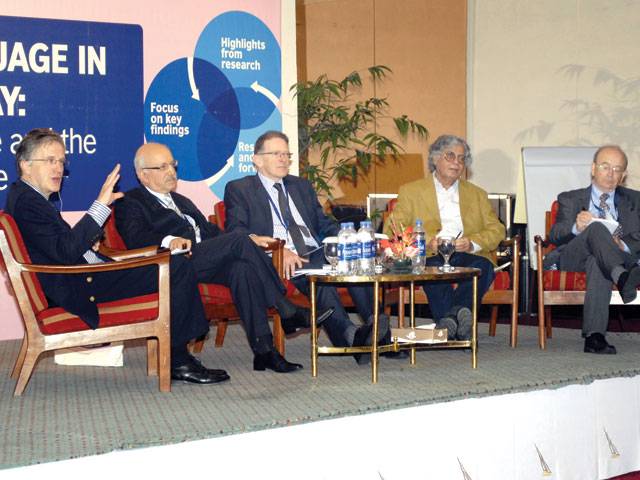LAHORE - Speakers at a policy dialogue titled “English language in Pakistan today: class, the workplace and the shift in language use” stressed the need for consistency in education policy to get better results.
The dialogue was organised by British Council here at a local hotel on Wednesday. British Council Director English Mussarrat Mashhadi presented the results of a research conducted by the council on the English teaching.
The focus of this policy dialogue was to engage educationists and language experts in an interactive discussion that would generate ideas and recommendations to feed into a more effective language policy.
The research shows that Pakistan is a country where English teaching is unevenly distributed and very much class based. People who can afford to go to private institutions have access to better learning material, authentic learning environments and well trained teachers which all encourage better English. In comparison poor and lower income families who do not have the means to send their children to these private expensive schools.
It says the existence of pseudo English medium schools is rampant in the society. These claim to have English as a medium of instruction but the entire conversation and communication between the students and the teachers is in Urdu. English is not taught as a language but rather as a subject, confined to the 40-minute English class sessions.
The urban-rural divide in the standard of English teaching is very wide. People in urban settings have much more choice and better quality of teaching and learning facilities available as compared to the rural areas. Interestingly, according to the research, 75 percent male teachers in public schools and 86 per cent male teachers in private schools say that English should be the medium of education; whereas 83 per cent female teachers in public schools and 89 percent in private schools say the same.
The dialogue offered rich and purposeful discussions on a range of issues through keynote speeches, panel discussions, round table discussions and provided an opportunity to offer opinions and recommendations; bringing together professionals from the education, media and economic sectors.
Themes discussed at the policy dialogue included a debate on ‘Whose English is it anyway?’, Exploring how English is used in advertising through the subtle shifts from concepts in English to copy in Urdu, whether English would as important today if Pakistan as an innovative manufacturing base and other relevant topics.
Talking to The Nation British Council Director Programmes Tony Jones said exposure for a foreign language was good for children and multilingualism was common in humans. He said that British Council was keen to raise the standards of English teaching in Pakistan. He said other than Punjab government, they were working with KPK government for the purpose. Furthermore, he said they would also be working with Sindh government soon for uplift of English teaching standards in the province.
Tony said: “Being in Lahore to discuss the English language in Pakistan with local experts has been a fascinating experience. May the debate and all conversations continue”. A survey presented on the occasion shows that acceptability of English is growing in Pakistan as the users of English language are also growing.
Lahore School of Economics Prof Dr Shahid Sidduiqe said that no language was weak or strong but it was socio economic factor which make any language weak or strong. He said language was not only reflection that what was going on in society but it was considered as life chance – education life chance, social life chance.
Addressing the audience, Beacon House National University Dean of Department of Education Dr Tariq Rehman said that “The best policy for medium of instruction is to teach small children in their mother tongue. The policy must be for all and not just for government institutions”.
Saturday, November 23, 2024
Call to bring consistency in education policy

Caption: Call to bring consistency in education policy
Arshad Bhatti
RDA suspends Metro operations in guise of routine maintenance
November 23, 2024
RCCI urges to intensify collective efforts for addressing smog issue
November 23, 2024
-
Digital nomadism redefines work and travel across the globe
-
Digital nomadism redefines work and travel across the globe
-
Lahore tops global pollution rankings as smog worsens, AQI reaches hazardous levels
-
Hunger crisis to increase in South Sudan, warns UN
-
Pakistan’s judiciary champions climate justice at COP29 in Baku
-
Punjab struggles with persistent smog as Met Office forecast rainfall
Paper Justice
November 23, 2024
No Silver Bullet
November 23, 2024
Reckless Accusations
November 23, 2024
UN Crossroads
November 22, 2024
Smog Trade-off
November 22, 2024
The World: No Longer Livable
November 23, 2024
Unveiling Protein Secrets with AI
November 23, 2024
Outdated Policy
November 23, 2024
Brain Drain
November 23, 2024
Proposal to counter increasing cases of harassment
November 22, 2024
ePaper - Nawaiwaqt
Nawaiwaqt Group | Copyright © 2024





